
Silvia Merler
Silvia Merler, an Italian citizen, is the Head of ESG and Policy Research at Algebris Investments.
She joined Bruegel as Affiliate fellow at Bruegel in August 2013. Her main research interests include international macro and financial economics, central banking and EU institutions and policy making.
Before joining Bruegel, she worked as Economic Analyst in DG Economic and Financial Affairs of the European Commission (ECFIN). There she focused on macro-financial stability as well as financial assistance and stability mechanisms, in particular on the European Stability Mechanism (ESM), providing supportive analysis for the policy negotiations.
Featured work

How can macroprudential policy mitigate climate-related systemic risk?
This joint Bruegel - National Bank of Slovakia event, held in Bratislava, discussed the benefits and limits of Green macroprudential policy.
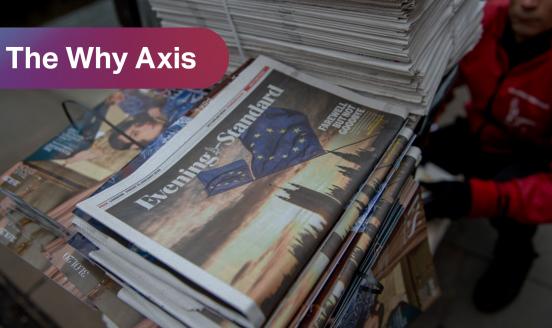
Is the current crisis management framework enough for the age of digital bank runs?

Fast and furious: how digital bank runs challenge the banking-crisis rulebook
The speed of recent bank failures has shown the need for more systemic protection of the financial system.

War in Ukraine: implications for the global financial system and central banks
A special episode of the Sound of Economics Live on the global financial system and central banks in the wake of sanctions imposed on Russia.

How Europe can sustain Russia sanctions
Russia's war in Ukraine has underscored the need for Europe finally to invest more in its own defence and security. Such an outrageous act of aggressi

The microeconomics of Christmas
Review of major contributions to the literature on the controversial topic of the deadweight loss of Christmas.

Les gilets jaunes
For weeks, protesters wearing yellow motorist vests have taken to the streets of Paris to protest against the rising price of fuel. They have since ta

Green central banking
A few weeks ago, Silvia Merler discussed the rise of “ethical investing”. A related question emerging from the discussion is whether central banks sho

Machine learning and economics
Machine learning (ML), together with artificial intelligence (AI), is a hot topic. Economists have been looking into machine learning applications not

Could Italian private wealth compensate for flight of foreign bond-holders?
Italy’s deputy prime minister Matteo Salvini is "convinced" that Italians can help out their government, in the face of a widening yield spread betwee

The Brexit withdrawal agreement
On November 14th the UK government cabinet approved the draft text of the withdrawal agreement, the deal reached between EU and UK negotiators. The de

Jair Bolsonaro’s Brazil
Far-right candidate Jair Bolsonaro won the Brazilian presidential elections after a highly polarising campaign. We review economists’ and scholars’ vi

The rise of 'ethical' investing
We are used to think about the value of investment as measured by financial return. But investing with an eye to environmental or social issues and, m

The United States-Mexico-Canada free trade agreement (USMCA)
While final ratification of the USMCA (also known as Nafta 2.0) is pending, we review economists’ assessment of the agreement.

The 2018 Nobel Prize: Growth and the environment
The 2018 Nobel Prize in Economic Sciences has been awarded jointly to William Nordhaus and Paul Romer for integrating respectively climate change and

Improving the efficiency and legitimacy of the EU: A bottom-up approach
The 2019 European elections promise to be a watershed moment for the EU. A recent Bruegel paper made the case for restructuring the Union’s model of g

Financial panic and the Great Recession
A debate on the roles of financial panic in the Great Recession has been pitting Ben Bernanke against Paul Krugman in what has been characterised as “

Digesting the Salzburg Summit
As the moment of truth for Brexit negotiations is approaching, with the October European Council around the corner, we review opinions on the outcome

Inequality in China
After amply discussing income inequality in Europe and the US, economists are now looking at the magnitude, implications and possible remedies for thi

Reforming the EU fiscal framework
Researchers have often highlighted the problematic nature of the currently very complex EU fiscal framework. Here we review economists’ views on how i

Lehman Brothers: 10 Years After
Ten years after the bankruptcy that shook the world, we review economists’ take on the lessons learned from the global financial crisis.
Monetary policy and superstar firms
The yearly Jackson Hole gathering of central bankers has focused this year on the topic of changing market structure, the rise of superstar firms, and

Italy’s capital flight: 2011, 2016, and early 2018
International investors have been repositioning vis-à-vis Italy, after the new government took office in early May. We compare this summer turmoil to

The Turkish Crisis
Financial markets have been very nervous about Turkey for the past few weeks. We review economists’ opinions about the economic, political and geopoli

Italy's "Dignity Decree"
The new Italian government pushed through its first legislative act including elements of labour market reform. Presented as an overturn of the previo

Economy of Intangibles
Economists have been discussing the implications of the rise of the intangible economy in relation to the secular stagnation hypothesis, and looking m

World Cup Economics
As we approach the final rounds of the tournament, here are some recent contributions about the economics and economic impact of the World Cup.

US tariffs and China's holding of Treasuries
China has the biggest bilateral trade surplus vis-à-vis the US but is also a top holder of US government bonds. While China has started to counteract

The Meseberg declaration and euro-zone reform
The recent Franco-German Meseberg declaration will set the scene for next week’s summit. We review opinions on this important agreement.

Demographics and Long Run Growth
Scholars have been investigating the relationship between demographics and long term growth, in the context of the secular stagnation hypothesis. We r

The Italian mini-BOT debate
Talks of parallel currency are not new in Italy. But one of the proposals – the so called mini-BOT – has made it into the government contract that und

The Italian Crisis
While Italy has been through one of the gravest institutional crises in its history, we review recent opinions on the topic.

How worried should we be about an Italian debt crisis?
Political backlash to slow growth and immigration has produced the least cooperative government imaginable in Italy, a coalition between the left-popu

Argentina’s troubles
Argentina has abruptly called on the International Monetary Fund for financial help, amid currency pressures. We review recent economists’ position on

200 Years of Karl Marx
May 5th 2018 marked the 200th anniversary of the birth of Karl Marx. We review some economists’ takes on the controversial philosopher’s legacy.

Did Economics Fail?
The debate about rethinking economics keeps rambling. We summarise newest contributions to this important discussion.

The cost of remittances
Remittances flows are very important for developing countries. In 2009 the G8 pledged to reduce the cost of remittances to 5%, a commitment that was e

The debate on euro-area reform
A paper jointly written by 14 French and German economists set off a debate about the reform of euro-area macroeconomic governance. We review economis

Latvia’s money laundering scandal
Latvia’s third largest bank ABLV sought emergency liquidity from the ECB and eventually voted to start a process of voluntary liquidation, after being

Milton Friedman's " The role of monetary policy" - 50 years later
In March 1968, Milton Friedman’s “The Role of Monetary Policy” - after his famous presidential address to the American Economic Association - was publ

The Brexit Transition Deal
Michel Barnier, the European Union’s Brexit negotiator, and David Davis, Britain’s Brexit secretary, announced a transition deal on March 19. We revie

Capital Markets Union and the Fintech Opportunity
Fintech has the potential to change financial intermediation structures substantially. It could disrupt existing financial intermediation with new bus

Central banks in the age of populism
Two years of elections have shown that we live in an age of increasing political and economic populism. What are the consequences of that for central

Are we steel friends?
The U.S. administration is considering to impose tariffs on steel (25%) and aluminium (10%), based on a national security argument. We review economis

The Italian elections
Italy goes to the polls on March 4, with a new electoral law that is largely viewed as unable to deliver a stable government. We review recent opinion

Venezuela’s hyperinflation
The International Monetary Fund forecasts Venezuelan inflation spiralling to 13,000 percent this year. As President Maduro is expected to introduce th

The stock market slide
The stock market dropped last week, leading to questions and debates as to the underlying reasons. We review economists’ views on the issue.

Economies of States, Economies of Cities
Both in Europe and the US, economists are starting to notice how the economies of cities have been sometimes diverging from the economies of states. W

The financial side of the productivity slowdown
Scholars have devoted much research to the “productivity puzzle” that has emerged after the crisis, and some are investigating the role of financial f
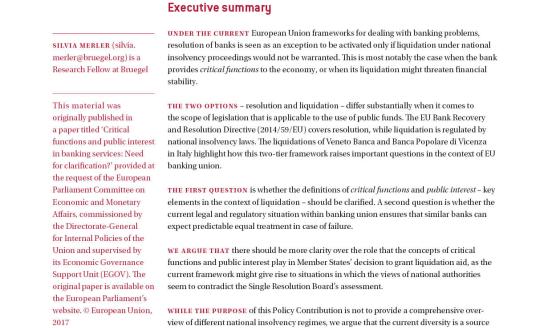
Bank liquidation in the European Union: clarification needed
Critical functions and public interest. What role do they play in Member States’ decision to grant liquidation aid? The author of this paper looks at

Abenomics, five years in
Five years have passed since Japan’s Prime Minister Shinzō Abe was elected in 2012 and started “Abenomics”, a macroeconomic package based upon the “th

The Republican Tax Plan (2): The debate rumbles on
Reactions to the Republican tax plans continue, concentrating on different aspects of the proposed legislation. We review the latest contributions.

Critical functions and public interest in banking services: Need for clarification?
What is the role that the concepts of critical functions and public interest play in Member States’ decision to grant liquidation aid? Silvia Merler l

The DSGE Model Quarrel (Again)
Dynamic Stochastic General Equilibrium models have come under fire since the financial crisis. A recent paper by Christiano, Eichenbaum and Trabandt –

The Bitcoin Bubble
The price of bitcoin has just passed $11,000. A year ago it was worth less than $800. Economists and commentators are thus increasingly concerned that
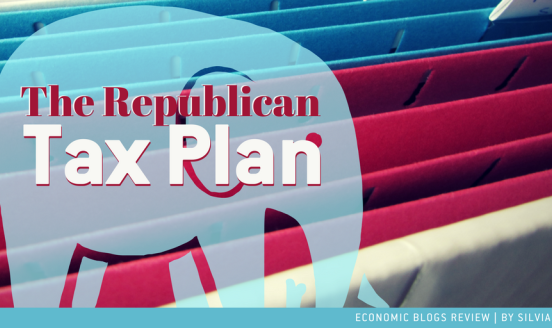
The Republican Tax Plan
As the Trump administration’s tax plan continues its way through the legislature, we review economists’ and commentators’ recent opinions on the matte

Has the Phillips curve disappeared?
The Phillips curve prescribes a negative trade-off between inflation and unemployment. Economists have been recently debating on whether the curve has
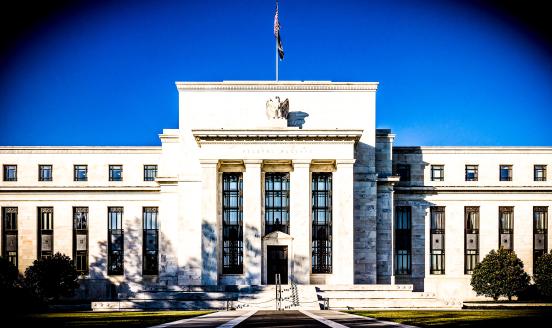
Powell's Federal Reserve
With the appointment of Jerome Powell as the next Fed’s chairman, President Trump break a tradition of bipartisan re-nomination and chooses someone wh

The Bank of England’s dovish hike
For the first time since 2007, the Bank of England raised interest rates, with a hike of 25 basis points. At the same time, it provided forward guidan
The capital tax cut debate
How much do workers gain from a capital gains tax cut? CEA chairman Hasset claims the tax cut will cause average household labour income to increase b
Bailout, bail-in and incentives
Ever since the outbreak of the global financial crisis, more and more rules have been developed to reduce the public cost of banking crises and increa

On the cost of gun ownership
On 1 October 2017, 59 people were killed and another 489 injured in what is currently the deadliest mass shooting in US modern history. The author rev

The Economics of Healthcare
Healthcare reform has been a thorn in the side of the US administration for several months, prompting President Trump to declare that “Nobody knew tha
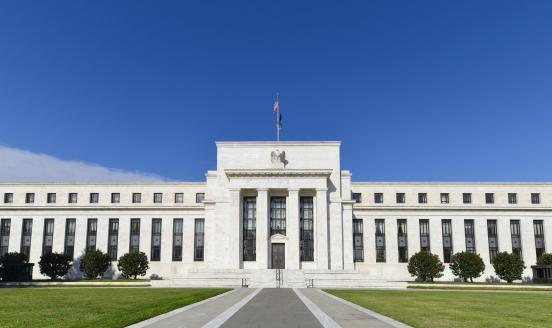
The Fed’s Unwinding
The Federal Open Market Committee (FOMC) held short-term interest rates steady on September 20th and announced that starting from October 2017 the Fed
Global Imbalances
The recent IMF’s External Sector Report highlighted the persistence of imbalances and a switch of imbalances towards advanced economies. We review rec

Capital Markets Union and the fintech opportunity
Fintech has the potential to change financial intermediation structures substantially. It could disrupt existing financial intermediation with new bus
North Korea: sanctions and marketization from below
What’s at stake: despite Western sanctions, North Korea has been in the news all summer. The country was in the spotlight for the death of American st

Remaking Europe: the new manufacturing as an engine for growth
Europe needs to know how it can realise the potential for industrial rejuvenation. How well are European firms responding to the new opportunities for
Hurricane Harvey’s economic impact
What’s at stake: tropical storm Harvey has caused unprecedented and catastrophic flooding in southeastern Texas. We review recent estimates of the eco
Africa and Chinese rebalancing
What’s at stake: China and Africa have developed close economic ties over the past 20 years. The need to rebalance the China-Africa relationship was a
The issue of U.S. prescription drug prices
What’s at stake: Americans spend a lot on prescription drugs, more per capita than any other country by far. Individual cases of sharp price increases

The US Antitrust Counter-Revolution
Plenty of recent research has highlighted a rise in concentration in the US economy, across different sectors. Economists are now wondering to what ex
The international effects of ECB’s monetary policy
What’s at stake: the literature on monetary policy spillovers is abundant of studies investigating the impact of the US Federal Reserve’s monetary pol
The US retail crisis
What’s at stake: America is undergoing a retail sector crisis, partly related to the increase of competition from online commerce. We review recent co
The forward guidance paradox
What’s at stake: the term “forward guidance” is used in economic jargon to describe central bank communications about the likely future path of policy
A tangled tale of bank liquidation in Venice
What can we learn about the Italian banking sector from the decision to liquidate Veneto Banca and Banca Popolare di Vicenza? Silvia Merler sees a ten
The US 100% renewables dispute
What’s at stake: Two years ago, a debate started on whether it would be feasible for the US to achieve 100% renewable energy power. The arguments on b

The Fed’s problem with inflation
What’s at stake: the Federal Reserve raised the benchmark interest rate by one-quarter of a percentage point. The moved surprised no one, but it still

The Universal Basic Income discussion
What’s at stake: the concept of a Universal Basic Income (UBI), an unconditional transfer paid to each individual, was prominent earlier this year whe

The Mariel Boatlift Controversy
What's at stake: how does immigration affect the wages of local workers? One way to answer this question is by exploiting a natural experiment. The Ma
President Trump’s budget: the 3% growth quandary
What’s at stake: the Trump administration released its full budget proposal. Economists have been arguing about the feasibility of the underlying grow
The US and the productivity puzzle
What’s at stake: Productivity growth fell sharply following the global financial crisis and has remained sluggish since, inducing many to talk of a “p
The Trump tax cut
What’s at stake: on Wednesday, the Trump administration - now 100 days old - unveiled a draft tax plan including the intention to enact a radical cut
The decline of the labour share of income
What’s at stake: at odds with the conventional wisdom of constant factor shares, the portion of national income accruing to labour has been trending d
Italian banks: not quiet on the eastern front
Italian banks are back in the spotlight. After MPS failed to raise enough capital from private investors earlier this year, Banco Popolare di Vicenza
The American opioid epidemics
What’s at stake: The US Department of Health and Human Services (HHS) declares that the country is “in the midst of an unprecedented opioid epidemic”.
The inflation basket case
Inflation in the euro area has finally reached 2%. But Draghi is right to warn that the underlying dynamics do not point to this being a self-sustaini
Taxing robots?
What’s at stake: “More human than human”, was the motto guiding the Tyrell Corporation’s engineering of biorobotic androids, in 1982’s Blade Runner. F
European identity and the economic crisis
What’s at stake: the EU prepares to mark the 60th anniversary of the Treaty of Rome, and the European Commission has presented a white paper “on the f
Should we worry about Greek banks?
Earlier this month, the IMF and the European institutions clashed over conditions for sustainability of the Greek debt. One of the main disagreements
Big data and first-degree price discrimination
What’s at stake: first-degree price discrimination - or person-specific pricing, had until recently been considered a theoretical case with unlikely r
Is Germany a currency manipulator?
What’s at stake: the Financial Times reports that Peter Navarro, head of the US’s National Trade Council, has accused Germany of currency manipulation
Climate change and financial markets
What’s at stake: Ever since the 2016 Paris Agreement to reduce emissions was signed, researchers have been looking at the impact that moves towards a
Tariffs and the American poor
What’s at stake: much has been said and debated — during the US election and beyond — about the distributional impact of free trade on the disadvanta
The economic effects of migration
What’s at stake: migration is currently a very hot topic in both the US and the EU. Immigration issues have come to the forefront due to the problem o
Compensating the “losers” of globalisation
What’s at stake: According to some, 2016’s political turmoil shows that the so-called “losers” of globalisation are striking back. There is, however,
2016: The end
What’s at stake: 2016 is coming to an end. It will be remembered as an annus mirabilis and horribilis, at the same time. 2016 brought us some previous
The strange case of the MPS capital shortfall
Italy's banking saga continues with the announcement that beleaguered MPS may need to find an additional €3bn. What exactly has changed, and what does
The American dream
What’s at stake: historian James Truslow Adams, in his 1931 book The Epic of America, stated that the American dream is "that dream of a land in which
Socio-economic determinants of the Italian vote
The socio-economic factors driving the 'no' result from Italy's referendum differ from the Brexit vote. The Italian NO vote seems to have been driven
The political economy of macroprudential policy
What’s at stake: the emergence of renewed interest in macroprudential policy has characterised the aftermath of the great recession. There is not yet
Financial implications of the Italian referendum
On Sunday, Italy will held a constitutional referendum whose implications for the political stability of the country are uncertain. Right after the re
The Italian referendum
What’s at stake: on 4 December, Italy will hold a referendum on a proposed constitutional reform approved by Parliament in April. The reform, which wa
An update: Sovereign bond holdings in the euro area – the impact of QE
Since the ECB’s announcement of its QE programme in January 2015, national central banks have been buying government and national agency bonds. In thi
Trumpocalypse now: first reactions
What’s at stake: this question should probably be re-formulated as “what’s NOT at stake?” On Tuesday 8 November, the US elected Donald Trump as its ne
Brexit and the law
What’s at stake: last week, the UK High Court ruled that the triggering of Article 50 - and therefore the Brexit process - should involve the UK Parli
Income convergence during the crisis: did EU funds provide a buffer?
Did EU funds play an important role in limiting the hit of the crisis on regional income?
Monetary policy at the time of elections
What’s at stake: At this week’s meeting, the Federal Reserve left interest rates unchanged. While this was largely expected, the economic blogosphere
The Wallonian Resistance
What's at stake: this week has been filled with news that the small Belgian region of Wallonia intended to veto CETA (the Canada-EU trade agreement).
An Italian take on banking crisis
The year 2016 has not been good to Italian banks. While resilient to the first wave of financial crisis in 2008, due to their low exposure to US sub-p
Should we rethink fiscal policy?
What’s at stake: there has been quite some discussion recently on whether we should rethink the framework of fiscal policy in order to make it more ap
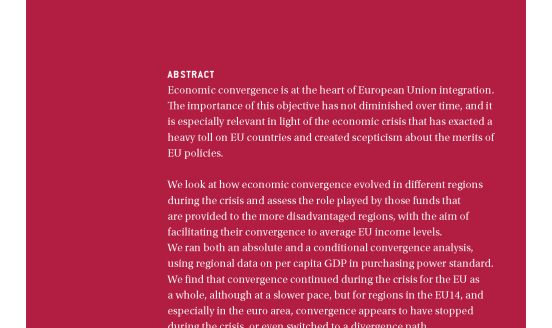
Income convergence during the crisis: did EU funds provide a buffer?
This paper shows that economic convergence continued during the crisis for the EU as a whole, although at a slower pace, but for regions in the EU14,
Brexit, the pound and the UK current account
What’s at stake: UK PM Theresa May announced the intention to trigger article 50 by March 2017, the Pound Sterling crashed, and a dispute among Tesco
The Deutsche Bank Frenzy and what it says about European banks
What’s at stake: The IMF recently published its Fall Global Financial Stability Report, which points to a decrease in short-term risk but building of
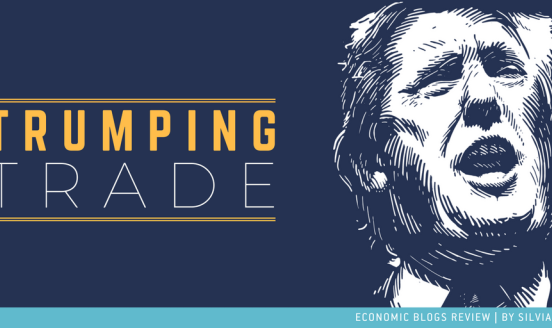
Trumping Trade
What’s at stake: Trade is a central topic in the US presidential campaign, with both candidates expressing some degree of criticism about past trade p
Big in Japan
What’s at stake: This week saw two important Central Banks’ meetings, whose outcomes could hardly be more different. While the U.S. Federal Reserve le
The US infrastructure investment debate
What’s at stake: Infrastructure investment has been and will continue to be a prominent campaign theme in the run up to the US elections. Both Hillary
The Apple of Discord
What’s at stake:
On August 30th, following the results of an in-depth state aid investigation started in 2014, the European Commission concluded t
Post-Jackson Hole low morale
What’s at stake: this year’s edition of the Jackson Hole symposium was awaited as an occasion to discuss how to redesign monetary policy for the futur

Total assets versus risk weighted assets: does it matter for MREL?
As a consequence of the global financial crisis, various initiatives have been taken in different jurisdictions to ensure the future resolvability of
Italy’s bail-in headache
Weakness in the Italian banking sector is a major concern for the euro area. Retail investors stand to lose out if BRRD bail-in rules are strictly app
Brexit: who trades what with the UK?
The result of the UK referendum to leave the European union will likely impact the UK’s trade with other countries. Our database shows what products E
Sovereign bond holdings in the euro area - the impact of QE
Since the announcement of the QE programme by the European Central Bank (ECB) on 22 January 2015, national central banks have been buying government a
Italy's Atlas bank bailout fund: the shareholder of last resort
Italy’s new bank fund Atlas might be what is needed in the short run, but in the longer term the fund will increase systemic risk. What ultimately mat
ECB TLTRO 2.0 - Lending at negative rates
On Thursday, the ECB surprised observers by announcing a new series of four targeted longer-term refinancing operations (TLTRO II) to be started in Ju
Brexit endangers London’s status as a financial hub
The UK’s competitive edge in financial services is substantial and would be difficult to dislodge. But Brexit could damage London’s attractiveness as
Fog in the Channel: Brexit through the eyes of international trade
As we approach the referendum that will decide whether the UK continues to be a member of the European Union, we review the UK’s trade position. If Br
Hard times for Italian banks
Silvia Merler and Marcello Minenna review the structure of of the recently adopted Italian guarantees scheme, and look at solutions implemented in oth
EU migration crisis: facts, figures and disappointments
Attempts to stem the flow of refugees to Europe have so far had little success. Two months into 2016, we take a detailed look at the numbers of the re

Analysis of developments in EU capital flows in the global context (2nd report)
The purpose of our report is to provide a comprehensive overview of capital
movements in Europe in a global context.
Bad banks and rude awakenings: Italian banks at a crossroads
Italian banks have recently come under market pressure, as investors seemed to have grown worried about the sector. This triggered a speed-up in the d
A financial side to a macroeconomic story: macro imbalances and financial integration in the euro area
In a recent paper, I looked at the evolution of financial cycles in the euro area and at their link with capital flows. Here, I focus on how those fin
Un’altra puntata nella saga dei guai bancari italiani
Dopo una lunga amministrazione controllata, si è raggiunto il momento della risoluzione per quattro piccole banche (Banca Marche, Cassa di risparmio d
Italian “creative” resolution, episode 2
As four tiny Italian banks are being restructured, Italy is again looking for a “creative” approach to bank resolution, which however looks a little b
Capital flows, financial cycles, and macro-prudential policy in the euro area
The financial crisis has prompted a renewed interest in macro-prudential policy as a framework to address the stability of the financial system as a w
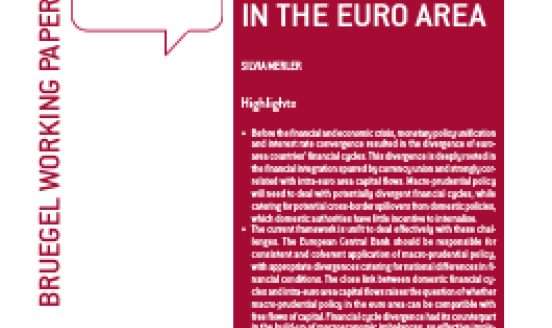
Squaring the cycle: capital flows, financial cycles, and macro-prudential policy in the euro area
The financial crisis has prompted a renewed interest in macro-prudential policy as a framework to address the stability of the financial system as a w
Greek bank recap
The ECB published the comprehensive assessment of the four major Greek banks (Alpha Bank, Eurobank, National Bank of Greece and Piraeus Bank) yesterd
Greece budget update - October
The Finance Ministry of Greece has published the preliminary budget execution bulletin for September, covering the first 9 months of the year. It reve
Greece budget update - September
Last week, while Europe was anticipating the Greek election, the Greek finance ministry published the latest budget execution bulletin, covering Janua
Greece budget update - August
The Greek finance ministry published last week the latest budget execution bulletin. The state budget primary balance increased significantly during J
Now you see it, now you don’t
The first Italian case of bail-in.
Greece budget update
Primary surplus picked up in June, but July is the key month to watch.
Preserving the Greek financial sector: options for recap and assistance
Regaining the stability of the Greek financial sector is key, as a meltdown could lead to Grexit. The stability of the Greek financial system currentl
The Greek last-chance proposal: stepping backwards to move forward?
Greece sent its proposal to Brussels yesterday, in an attempt to pave the way for the negotiation of a third ESM programme. The package makes signific
#Greferendum
Defying hopes that negotiations could lead to an agreement between Greece and its creditors by the end of the week and ahead of the programme expiring
Greece budget update
As Eurogroup discussions with Greece continue, the latest budget execution bulletin from the Greek finance ministry has been published yesterday, comp
Waiting for the Four Presidents' Report
The Four Presidents’ Report on the Economic and Monetary Union (EMU) is expected to be released at the end of June, outlining how to strengthen econom
Greece: where we stand and what to watch
It has been an intense couple of days on the front of Greek negotiations, with leaks from both sides. Beyond the noise, here are some key points to wa
“Dura Lex, sed Lex”(?)
On the 30th of April, the Italian Constitutional Court issued a decision on the pension reform introduced by the Monti government in 2011. The decisio
Greece’s hot summer
After a Eurogroup meeting that appears to have not achieved much progress, and after Greece met its most recent payment due to the IMF drawing on its
Big improvement in the Greek primary budget
Ahead of what promises to be a very tense negotiation period, the Greek Ministry of Finance released the preliminary budget execution data for the fir
Deferred tax credits may soon become deferred troubles for some European banks
The 2015 Greek redemptions’ path
Tomorrow, the Eurogroup meets to discuss the Greek government’s plan to reach an agreement with the Country’s public creditors. The sense of urge
Greece: update on public finances
At the end of last week the Greek Finance Ministry published the preliminary budget execution bulletin for February. The State primary budget balance
Greek payment deadlines ahead
Discussions between Greece and its creditors are due to restart tomorrow. In the meantime, the pressure on Greece is increasing. Here we take a
Welcome to the dark side: GDP revision and the non-observed economy
Back in 2009, the United Nations Statistical Commission endorsed a revision to the System of National Accounts (SNA), which sets the international sta
A Greek primary issue
On the 25th February, the Greek ministry of finance published the final data for the execution of the State Budget in January 2015. This data is
Fact of the week - The tiny balance sheet impact of the TLTRO (charted)
While waiting for the ECB to start QE purchases in March, an update of our Eurosystem liquidity database allows capturing the (non)-impact o
ECB collateral damages on Greece
The European Central Bank’s Governing Council lifted the waiver of minimum credit rating requirements for greek government bonds which, until yesterda
Who’s (still) exposed to Greece?
Following the recent elections, Greece has come under pressure. Fear is growing about the stance of the newly elected government and there have been s
The ECB has fired its bazooka
The ECB announced today an expansion of its asset purchases, to include securities issued by European agencies and institutions, as well as central go
The ECJ suggests OMT is compatible with the Treaty, but not with the Troika
the European Court of Justice’s Advocate General observed that the framing and implementation of monetary policy are the exclusive competence of the E

Analysis of developments in EU capital flows in the global context
This report reviews the key theoretical foundations underlying the benefits and risks of net capital flows, in particular large, persistent inflows or
Eurozone South is still not a place for young workers
Eurostat released today the latest seasonally adjusted quarterly data for unemployment. Youth unemployment has been decreasing (slowly) in Greece, Ire
30% of the Euro Area HICP basket is now in outright deflation
A look at the composition of the HICP basket for the euro area shows that the percentage of items that are now in outright deflation has risen to 30%
TLTRO spoils Christmas holidays at the ECB
It’s beginning to look a lot like Christmas, but it does not look like Santa Claus has any intention to stop by Frankfurt. Today, the ECB revealed the
The ECB winter of discontent
It was the last meeting before Christmas at the ECB, as well as the first in the new premises and the last with a non-rotating voting system. It ended
“Unanimous” is the new black
As it was largely anticipated, no new measures were announced Thursday at the ECB meeting. But sometimes words can be as important as facts.
Vicious circle(s) 2.0
Since the beginning of the crisis – and more so since 2010 – Europeans have been looking at the sovereign-banking “vicious circle”, tying the dismal f
How I learned to stop worrying about TARGET2 and love the ECB
There always comes a time we have to face our past. For economists, it often happens when updating data long left sitting in a remote corner of o
Monday blues for Italian banks
On Sunday, the ECB and EBA published the results of their comprehensive assessment of banks balance sheets, and Italian banks where the worst performe
Fact of the week: Not one European city in the top 10 for tech talent
Two recent LinkedIn analyses show some interesting facts about work-related migration in the 21st century and how this reshapes the world’s economic e
China seeking to cash in on Europe’s crises
Last Monday, I posted about the increasing investment of China in Russia, wondering whether and to what extent it could help Russia smooth the economi
Fact: Dim Sum bonds are not coming to rescue Russia's banks
Despite Russian efforts, it seems Asian markets will not provide a quick fix, as yields on yuan-denominated bonds issued by Russian entities have been
Russian Roulette, reloaded
European attention will be back to Russia and Ukraine this week, as sanctions are reviewed. In the meantime, important changes have taken place.
Whose is Russia’s external debt?
Data from the Central Bank of Russia show that, as of 1st Quarter of 2014, 90% of the country’s external debt was attributable to banks and other (non
The ECB’s ABC of ABS is missing a few letters
After the ECB last month announced a programme of private sector assets purchases, all eyes were directed at Frankfurt yesterday. As expected, the ECB
T-LTRO: variation on a (ECB’s) theme
Last Thursday the ECB unveiled its “big bazooka plan” to fight the threat of deflation in the Euro area. Among the measure announced, there is a varia
Fact: The World still fears fiscal crises (and much else)
Super Mario: 1up?
The stake at this month’s meeting of the ECB’s Governing Council was exceptionally high. Mario Draghi himself raised the bar of expectations, with his
Fact: T.L.T.R.O. is Too Low To Resuscitate Optimism
Yesterday the ECB held the first auction of liquidity under its new TLTRO programme. The take up was well below expectations, raising questions a

EU to DO 2015-2019
Memos to the new EU leadership.
Fact of the week: Norway is the safest place on Earth
Standard and Poor’s published its Global Sovereign Debt report for the second quarter of 2014 recently. The report ranks countries according
Is there a path to political union?
Debunking some myths about Europeans’ attitudes towards European integration.
Fact: Banco Espirito Santo gets a 4 billion euro recap
Over the weekend, Portuguese authorities announced the recapitalisation plan for Banco Espirito Santo, involving a 4.4 bn euro capital injection. BES
Fact of the week: Russia sanctioned from all sides
Yesterday, the EU introduced new sanctions targeted at specific sectors of the Russian economy. This came one day after an international arbitration c
Fact of the week: Lithuania changes the ECB’s voting system
Lithuania will become the 19th member of the Euro area on the 1st of January, following Wednesday’s Council endorsement. The most important part of th
T-(rompe-l’Oeil)-LTRO
I already pointed out that several important points were quite vague in the initial ECB T-LTRO announcement. Some of these have been clarified, b
Fact of the week: A spam newsletter caused a bank run in Bulgaria
It’s been a tense week in Bulgaria. Two bank runs occurred last week, with depositors withdrawing the equivalent of 10% and 20% of the assets held by&
Fact of the week: Only 8% of banks says they will need to raise capital after AQR
The European Banking Barometer for the first half of 2014 gives a very interesting snapshot of the banking sector’s perceptions about macroe
Comfortably numb: ESM direct recapitalization
On one hand, the crises has eased over these two years, and the sense of urgency for this instrument in the eyes of both policy makers, markets and ex
An Italian déjà-vu
The European Commission published today its country-specific recommendations, in the context of the European semester. The leitmotiv, in the case of I
The Renzi-Frenzy
If there’s a rule that Italian voters learn quickly, it’s never to trust provisional election results. They have a tendency to display spectacular rev
Addressing weak inflation: The ECB’s shopping list
In this blogpost, we summarize our recently published paper, in which we discuss in detail the dilemmas for the ECB and the need to act. Inflation for
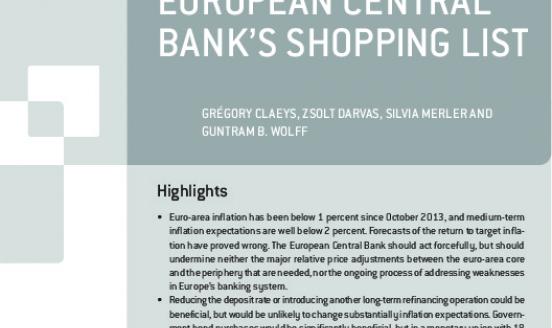
Addressing weak inflation: The European Central Bank's shopping list
Euro-area inflation has been below 1 percent since October 2013, and medium-term inflation expectations are well below 2 percent. Forecasts of the ret
Shrinking times
Over the last 5 years, the Eurozone financial system has been flooded with liquidity, due to the ECB’s very special response to the very special bank-
Is there a risk of deflation in the euro area?
Even though the euro area as a whole has not yet entered into deflation, this picture is worrying. Low inflation rates will make the relative price ad
Russian roulette
The possibility that this geopolitical crisis spills over from the Eastern Europe to the (closer) Mediterranean and even the core of the EU cannot to
The European Parliament improves banking union
After a round of negotiation which lasted a full 16 hours, the Parliament and the Council reached a provisional agreement on the proposed Single Resol
Every saint has a past, every sinner has a future
The European Commission published yesterday the results of its in-depth reviews (IDRs) to assess the existence of macroeconomic imbalan
European Bank Resolution: don’t try this at home
How would the resolution of a bank work, in practice? Let’s go step by step.
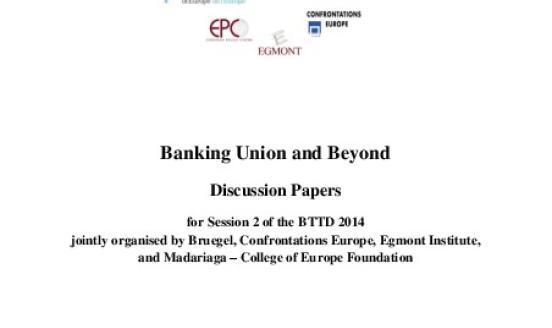
Banking Union and Beyond: Discussion papers for Brussels Think Tank Dialogue
The economic session of the BTTD 2014 will review the progress on banking union so far and ask what else is missing in the EMU architecture to complem
2014 Financial Odyssey
The European Banking Union matures in 2014, with the ECB assuming its role as single supervisor. This column outlines the transition to the new steady
Home-(Sweet Home)-Bias and other stories
Behind the relative calm that now seems to reign on the financial markets, fragmentation is still there. And if you see it charted, it is actually qui
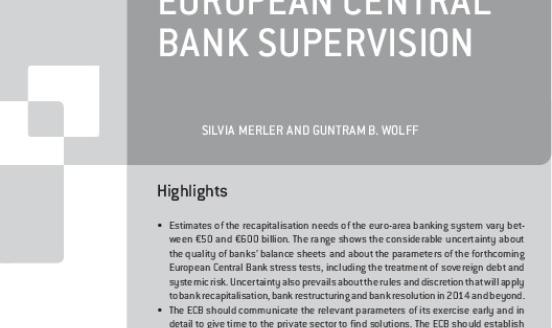
Ending uncertainty: recapitalisation under European Central Bank supervision
This Policy contribution was prepared for the ECON committee of the European Parliament. Estimates of the recapitalisation needs of the euro-area bank
The liquidity quandary
The risk connected to the normalisation of the liquidity condition in the Eurozone exists. It should therefore be acknowledged and its impact assessed
Europe should ask the US to shutdown political uncertainty
China urged the US political system to end its political impasse quickly – on which Europe should insist. End this highly dangerous game, be
Which role should the ECB give up?
In a briefing paper written for the European Parliament’s Monetary Dialogue with ECB President Draghi, we look at old and new competences of
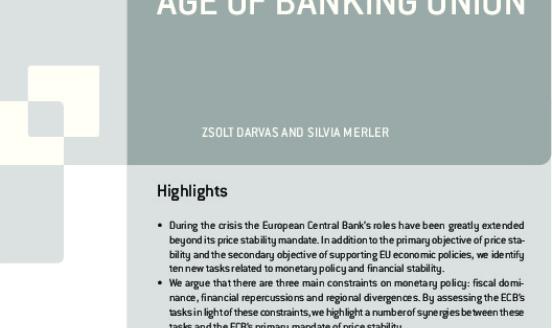
The European Central Bank in the age of banking union
This Policy Contribution was prepared for the European Parliament's 'Monetary Dialogue with the President of the European Central Bank Mario Draghi. D
Balancing the new and old roles of the ECB
-15% to +4%: Taylor-rule interest rates for euro area countries
Does one size fit all? Before the crisis, there was a major debate on whether the single interest rate set by the European Central Bank (ECB) would be
Capital outflows in the euro area: is there a sign of relief?
An update of the underlying data to September 2012 suggests that private capital outflows from a number of Southern European countries has showed sign

Policy Lessons from the Eurozone Crisis
Co-authored by Chiara Angeloni and Silvia Merler.
The current European crisis has shed light on several weaknesses and the institutional incompletenes
Spain: a tale of two crises
Introducing the Bruegel dataset of sovereign bonds holdings (and more)
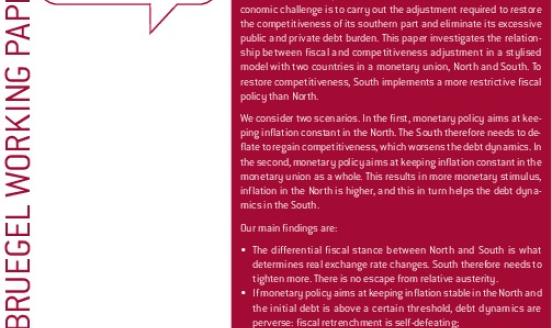
The simple macroeconomics of North and South in EMU
The euro area today consists of a competitive, moderately leveraged North and an uncompetitive, over-indebted South. Its main macroeconomic challenge
Capital flight in the Euro area: from bad to worse
Chart of the week - The consequences of financial disintegration
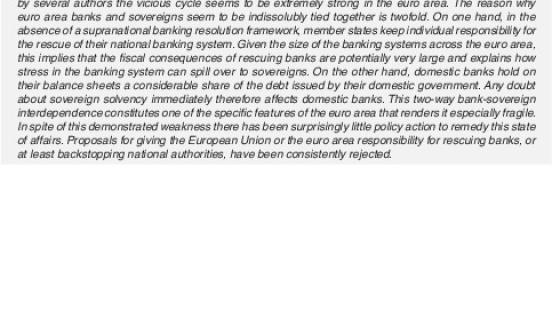
Hazardous tango: sovereign-bank interdependence and financial stability in the euro area
Sudden stops in the euro area
Many analysts and observers have put forward that the euro crisis is a balance-of-payments crisis at least as much as a fiscal crisis. The issue has g

Sudden stops in the euro area
There is a view that the euro crisis is a balance-of-payments crisis at least as much as a fiscal crisis.The balance-of-payments discussion lacks clar
Actual and cosmetic changes in debt sustainability
The leaked Debt Sustainability Analysis (DSA) produced by the IMF in February 2012 looked into the economic developments that would arise in Greece
The leaked second economic adjustment programme for Greece
The European Commission has produced an new document on the Second Economic Adjustment Programme for Greece, which you can find here.
The s
What is the meaning of TARGET balances?
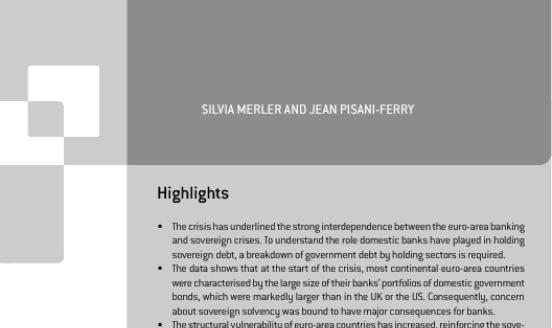
Who's afraid of sovereign bonds?
The December large-scale provision of liquidity to banks by the ECB contributed to reducing spreads on Southern European sovereign bonds, but did it c